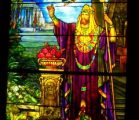VI. The revelation contained in our Bibles is perfectly credible.The…
VI. The revelation contained in our Bibles is perfectly credible.The several parts of it are so connected,that we cannot receive any one without receiving the whole,every part tending to establish the credit of another.In the new testament we have the history of the fulfillment of the typical and verbal predictions of the old.Nay, in each testament,we have not a little historical fulfilment of some preceding predictions.If,therefore,we receive the predictions,we must receive the history of their fulfilment as credible.If we accept the history of fulfilment ,we cannot reject the predictions as forged.
As the transactions of the new testament lie nearest our times,let us first examine its credibility.That Christianity is no modern invention,but was professed about 1700 years ago,is attested by Clemens Romanus, Ignatius,Polycarp, Justin Martyr, Irenaeus,and Tatian, Christians,and_ by Tacitus, Sueton, Tiberianus, Serenus, Pliny the younger , Epictetus, Celsus, Porphyry, Hierocles, Marcus Antoninus and Julian, heathens. The once extant Acts of Pilate,- Tacitus, Sueton, Lampridius, Porphyry, Celsus, Hierocles and Pliny,as well as Josephus the Jew, mention Jesus Christ as then living and heading a sect of followers. Nor could such multitudes have agreed to profess his self-denying religion,if they had not had the fullest conviction of his existence.Many authors of that period wrote on other subjects, which didn’t lead them to speak of these things.And many more which perhaps mentioned them,are irrecoverably lost.
It is sufficiently credible,that some principal publishers of the Christian religion wrote books bearing the designations of those contained in our new testament.As that age was very remarkable for an itch of writing,we cannot reasonably imagine that the zealous Christians of it,took no care to record the amazing transactions of Jesus Christ their Lord,and his followers.In the writings ascribed to Barnabas, Clemens-Romanus, Hermas, Ignatius, Papias, Justin Martyr, Diognetus, – churches of Smyrna, Lyons, Vienne, – Dionysius of Corinth, Tatian, Hegesippus, Melito, Irenaeus, Athenagoras, Miltiades, Theophilus, Pantaenus, Clemens-Alexandrius, Polycrates, Quadratus, Aristides, Apollinaris and Symmachus, Who flourished before AD 200, while the apostolical manuscripts were still extant,we find multitudes of passages quoted from,or allusions made to the new testament. Even the epistle to the Hebrews, the 2nd of Peter, the 2nd and 3rd of John, and that of Jude,which being wrote to private persons,or to Jews, were the last known publicly by the churches, are quoted or acknowledged, though not so much as other books,by the earliest of the Christian writers. Celsus, the furious opposer of Christianity,about AD 150, produces a vast number of quotations from the new testament , in order to render it ridiculous.Moreover, the most of these books being written for, or to, societies of Christians, could not possibly be forged or easily corrupted.Their temporary doubts concerning some of them,till they got full proof of their apostolical original; their zealous rejection of spurious productions, and their putting the greatest distance between these Inspired books and those of their principal doctors, fully manifest their care to admit nothing for divinely Inspired, without sufficient proof. Whenever they discovered a forgery of a sacred book, such as the pretended Acts of Paul and Thecla, they speedily warned all the churches around to prevent their being imposed on.They were so remarkably zealous for their sacred books,that no,not the most exquisite tortures could force them to destroy or give them up to destruction.Nor did their most inveterate enemies pretend to dispute their genuineness.
It is no less evident, that the Jewish religion in its extensive form was introduced by Moses,and continued in Canaan for 1500 years, before it gave place to the Christian. Philo, Josephus, and many other Jewish writers, who lived about sixteen or seventeen hundred years ago,_ Strabo, Justin, Pliny the elder, Tacitus, Juvenal, Longinus, Numenius, Chalcidius, the Orphic Verses, Diodorus, Manetho, Cheremon, Apollonius, Lysimachus, Hermippus, Dion Cassius, Philemon, Polemon, Appion, Ptolemy, Hellanicus, Philocorus, Castor, Thallus,and Polyhistor, heathens, mention Moses or the Jewish antiquities. The Jews had sacred books among them of the same designations and contents with those in our old testament. The general division of them into Moses and the prophets, or Moses and the prophets,and Psalms, is expressly mentioned in the new testament, Luke 16:29,31 and Luke 24:27,44; Acts 26:22 and Acts 28:23; John 1:45.
[ SOURCE: The Systematic Theology of John Brown of Haddington(1722-1787),chapter 3= Of the revealed standard of religion contained in the scriptures of the old and new Testament, in its possibility, desirable ness, necessity , propriety, reasonable, credibility, divine authority and contents]
